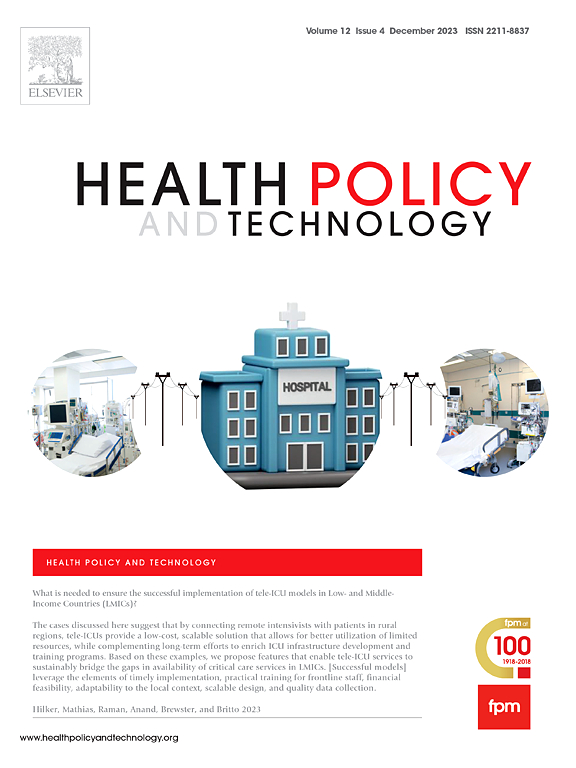Professional perspectives towards implementing artificial intelligence in next generation sequencing–based newborn screening: A Q methodology study
IF 3.7
3区 医学
Q1 HEALTH POLICY & SERVICES
引用次数: 0
Abstract
Background
The use of next generation sequencing (NGS) to expand current newborn screening (NBS) is being explored. NGS would enable early detection of more early onset diseases. However, to interpret a large amount of data within a short turn-around time, it is necessary to use artificial intelligence (AI). Use of AI in NGS-based NBS raises ethical and societal issues that require investigation of how healthcare professionals view the use of AI in this context and which requirements need to be met to realize responsible development and deployment of AI in NGS-based NBS.
Objective
To explore professionals’ perspectives on the requirements that are important for responsible development and deployment of AI in NGS-based NBS.
Methods
Q methodology was used to examine the perspectives of professionals, involving two steps: 1) an online focus group discussion to provide input for the development of 40 statements regarding requirements for responsible use of AI in NGS-based NBS and 2) an online sorting by the participants (N = 30) of the list of statements, according to their importance.
Results
The Q methodology approach identified two participant perspectives. The first emphasized the importance for professionals that they retain control over the task for which the AI is used. The second prioritized the importance of parental acceptance and of high uptake of the screening offer.
Conclusions
The findings indicate an overall optimistic attitude and suggest that for responsible development and implementation of AI in an NGS-based NBS, it is important to consider requirements covering ethical, legal and societal aspects.
在基于下一代测序的新生儿筛查中实施人工智能的专业观点:一项Q方法学研究
使用下一代测序(NGS)来扩大目前的新生儿筛查(NBS)正在探索中。NGS将能够及早发现更多早发性疾病。然而,要在短时间内解释大量数据,就必须使用人工智能(AI)。在基于ngs的国家统计局中使用人工智能引发了伦理和社会问题,需要调查医疗保健专业人员如何看待在这种情况下使用人工智能,以及需要满足哪些要求才能在基于ngs的国家统计局中实现负责任的人工智能开发和部署。目的探讨专业人士对基于ngs的国家统计局负责任开发和部署人工智能的重要需求的看法。使用sq方法来检查专业人员的观点,包括两个步骤:1)在线焦点小组讨论,为制定40个关于在基于ngs的国家统计局中负责任使用人工智能的要求的陈述提供输入;2)参与者(N = 30)根据陈述的重要性在线排序。结果Q方法学方法确定了两种参与者视角。第一次强调了专业人员对使用人工智能的任务的控制权的重要性。第二个优先考虑的是父母的接受和对筛查提议的高度接受的重要性。研究结果表明,总体上持乐观态度,并建议在基于ngs的国家统计局中负责任地开发和实施人工智能,重要的是要考虑涵盖道德、法律和社会方面的要求。
本文章由计算机程序翻译,如有差异,请以英文原文为准。
求助全文
约1分钟内获得全文
求助全文
来源期刊

Health Policy and Technology
Medicine-Health Policy
CiteScore
9.20
自引率
3.30%
发文量
78
审稿时长
88 days
期刊介绍:
Health Policy and Technology (HPT), is the official journal of the Fellowship of Postgraduate Medicine (FPM), a cross-disciplinary journal, which focuses on past, present and future health policy and the role of technology in clinical and non-clinical national and international health environments.
HPT provides a further excellent way for the FPM to continue to make important national and international contributions to development of policy and practice within medicine and related disciplines. The aim of HPT is to publish relevant, timely and accessible articles and commentaries to support policy-makers, health professionals, health technology providers, patient groups and academia interested in health policy and technology.
Topics covered by HPT will include:
- Health technology, including drug discovery, diagnostics, medicines, devices, therapeutic delivery and eHealth systems
- Cross-national comparisons on health policy using evidence-based approaches
- National studies on health policy to determine the outcomes of technology-driven initiatives
- Cross-border eHealth including health tourism
- The digital divide in mobility, access and affordability of healthcare
- Health technology assessment (HTA) methods and tools for evaluating the effectiveness of clinical and non-clinical health technologies
- Health and eHealth indicators and benchmarks (measure/metrics) for understanding the adoption and diffusion of health technologies
- Health and eHealth models and frameworks to support policy-makers and other stakeholders in decision-making
- Stakeholder engagement with health technologies (clinical and patient/citizen buy-in)
- Regulation and health economics
 求助内容:
求助内容: 应助结果提醒方式:
应助结果提醒方式:


